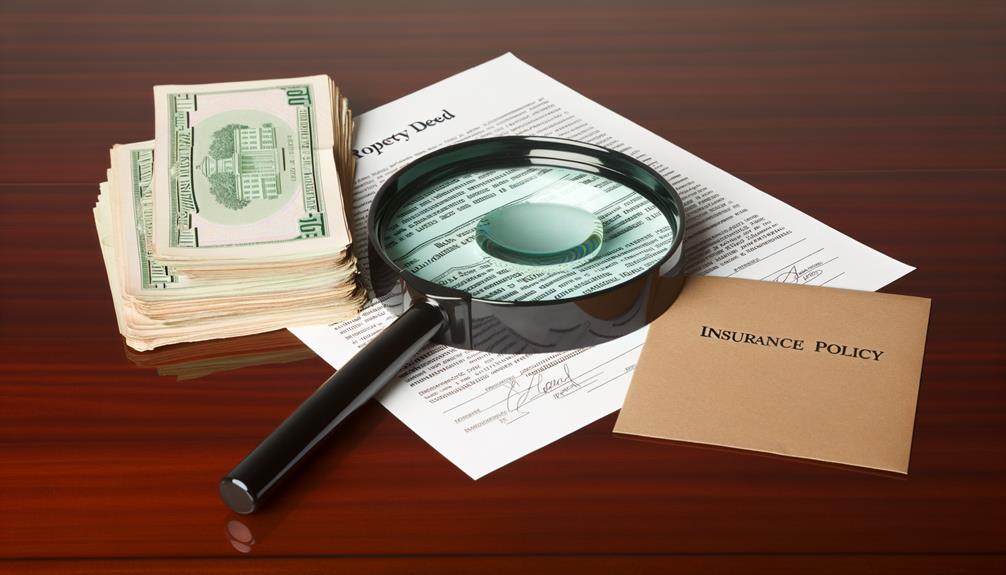The idea of paying cash for a house is often associated with the enticing prospect of sidestepping the cumbersome mortgage process and a potential reduction in closing costs.
However, navigating the landscape of a cash purchase is more nuanced than it may initially appear. There are still closing costs to consider, albeit potentially less than with a financed purchase. These include, but are not limited to, appraisal fees, attorney fees, and even certain title-related costs.
The question then becomes not if there are closing costs in a cash purchase, but rather, what these costs entail and how they can be effectively managed.
This discussion will provide an in-depth exploration of the financial implications of cash purchasing, dissecting the array of closing costs and how they compare to a traditional mortgage scenario.
Key Takeaways
- Cash buyers still incur closing costs when purchasing a house, including real estate transfer taxes, title insurance fees, processing and filing fees, appraisal fees, and home inspection fees.
- In addition to the traditional closing costs, cash buyers also need to consider hidden costs such as property taxes, homeowners insurance, home maintenance, and homeowners association fees.
- Cash buyers can minimize their expenses by negotiating closing costs, seeking alternatives for certain inspections, leveraging their negotiation power, and strategizing to minimize costs.
- Title search and insurance fees are an important aspect of closing costs for cash buyers, including the cost of title search, different types of title insurance, escrow fees, attorney fees, recording fees, and survey costs.
Understanding Closing Costs
Delving into the realm of closing costs, it's imperative to understand that for cash buyers, these costs encompass a range of fees including real estate transfer taxes, title insurance fees, processing and filing fees, appraisal fees, and home inspection fees.
Beyond these, property taxes, homeowners' insurance, home maintenance, homeowners' association fees, and utilities are also part of the financial responsibility. It's worth noting that even after making a cash offer and securing a House With Cash, property taxes remain, and one must anticipate potential tax rate hikes.
Homeowners' insurance costs hinge on various factors and may necessitate further coverage for flood or earthquake protection. Making a cash offer on a house can sidestep certain closing costs, such as appraisal fees and loan origination fees. However, cash for a house does not eliminate the need to cover fees related to title work, transfer fees, taxes, insurance, and attorney fees.
Therefore, in a real estate transaction, understanding these costs when paying cash is crucial to budgeting accurately and ensuring a smooth transaction.
Closing costs are an integral part of purchasing a home, requiring careful consideration and planning.
The Cash Buying Process
Navigating the cash buying process for a house entails comprehending cash transactions, revealing hidden costs, and effectively minimizing expenses.
This process presents a unique set of challenges and opportunities that differ significantly from traditional mortgage-based home purchases.
Understanding Cash Transactions
While purchasing a house with cash may seem straightforward, it is crucial to understand the intricacies of cash transactions. These include various closing costs such as real estate transfer taxes, title insurance fees, and other associated expenses. Indeed, home buyers closing costs are an essential part of cash transactions, often surprising many cash buyers.
Below is a table detailing some of these costs:
| Cost Type | Cash Buyers | Description |
|---|---|---|
| Real Estate Transfer Taxes | Applicable | Paid to transfer property from the seller to the buyer |
| Title Insurance Fees | Applicable | Protects buyers and lenders if the title is disputed |
| Appraisal Fees | Applicable | Paid to confirm the value of the home |
| Home Inspection Fees | Applicable | Covers the cost of a professional home inspection |
| Processing and Filing Fees | Applicable | Paid for forms submitted to the County Recorder |
In the end, paying cash for a home involves understanding these complexities.
Hidden Costs Revealed
In the realm of cash property transactions, hidden costs often lurk beneath the surface, demanding the cash buyer's attention and careful financial planning. While the allure of paying cash will make the Home Buying process seem simpler, it's essential to be cognizant of the fees associated with this process.
Closing Costs:
- Real estate transfer taxes
- Title insurance fee
- Processing and filing fees
- Appraisal fee and home inspection fee
In addition to these closing costs associated with Buying a House, there are additional costs to consider:
Additional Costs:
- Property taxes
- Homeowners insurance
- Home maintenance
- Homeowners association fees
- Ongoing utilities
Thorough planning can prevent unforeseen financial burdens, ensuring a smooth and successful cash property acquisition.
Minimizing Expenses Effectively
Having revealed the hidden costs associated with cash property transactions, it becomes imperative to strategize on minimizing these expenses effectively to ensure a financially sound and successful acquisition.
When making a cash purchase, knowledge of potential closing costs, such as transfer taxes, title insurance fees, processing, and filing fees, as well as appraisal and home inspection fees, is crucial.
Minimizing expenses effectively involves negotiating these costs or seeking alternatives where possible. For instance, you can shop around for a cheaper title insurance or forego certain inspections, if you deem it safe.
Also, remember that in cash transactions, the buyer has more leeway to negotiate the pay closing costs. Therefore, this should be leveraged when buying a home.
Cost Breakdown for Cash Buyers
Diving into the cost breakdown for cash buyers, it's crucial to account for not only the closing costs such as real estate transfer taxes, title insurance fee, processing and filing fees, appraisal fee, and home inspection fee, but also additional costs like property taxes, homeowners insurance, home maintenance, homeowners association fees, and utilities.
Here is a detailed breakdown:
Buyers Closing Costs
- Real Estate Transfer Taxes
- Title Insurance Fee
- Processing and Filing Fees
- Appraisal Fee
- Home Inspection Fee
Additional Costs
- Property Taxes
- Homeowners Insurance
- Home Maintenance
- Homeowners Association Fees
- Utilities
Title Search and Insurance Fees

Moving on to an equally important aspect, let's analyze the intricacies of title search and insurance fees in the closing cost structure.
A thorough title search is conducted by the title company to ensure the property is free of any liens or encumbrances. The cost of this search ranges from $75 to $500.
Title insurance is a crucial part of this process. It protects both the buyer and the lender from potential ownership disputes. There are two types of title insurance: the owner's title insurance policy and the lender's title insurance. While the latter is mandatory, the former is optional but highly recommended. The insurance fees for these policies usually equate to 0.5% to 1% of the total sales price.
In addition to title search and insurance fees, the title company also charges escrow fees, typically ranging between $250 and $350. Furthermore, there may be attorney fees for title review or closing attendance, varying by state.
Lastly, the title company may also require payment for recording fees for the deed and survey costs, adding to one's closing costs.
Property Tax Considerations
An essential aspect to consider when calculating closing costs is the property tax obligation, which varies significantly depending on the locality of the purchased house. These property tax considerations are critical because they impact the overall cost of buying a house, regardless of whether the purchase is cash or credit.
As part of your property tax considerations, you should note:
- The annual property tax rate in the area where you are buying.
- This rate is usually a percentage of the assessed value of the property, not the purchase price. It is crucial to understand this difference to avoid unexpected costs.
- The potential for future increases in property taxes.
- Several factors can lead to an increase in property taxes, including improvements to the property, increased neighborhood property values, or changes in local tax laws.
Homeowner's Insurance Costs

In the context of closing costs, homeowner's insurance costs emerge as a significant factor. To manage this expense, understanding insurance premiums and choosing the right coverage becomes paramount.
We will now engage in a discussion that sheds light on these aspects, providing essential insights for prospective homebuyers.
Understanding Insurance Premiums
Navigating the intricacies of insurance premiums, specifically for homeowner's insurance, is a crucial aspect of understanding the overall closing costs when purchasing a house with cash.
- Homeowners insurance is a requirement for property owners. It protects against potential damages or losses. The cost of your homeowners insurance is determined by:
- The value of the home
- The location
- The coverage limits and deductibles you choose
- Private mortgage insurance doesn't apply when paying cash for a house. However, understanding insurance premiums is essential if you later decide to take a mortgage on the property.
Choosing the Right Coverage
When it comes to selecting the right coverage for homeowners insurance, various factors such as location, size, value, deductible, and coverage significantly influence the cost.
In real estate transactions, choosing the right coverage can impact your overall housing expenses, including the fees charged associated with transferring ownership of the house. As an informed buyer, you should anticipate these costs and understand the value of the title being transferred.
While homeowners insurance is not traditionally considered a closing cost, it's an essential part of the financial responsibilities of owning a house. It's advisable to talk to your current insurer about cost estimates, particularly if your new home has specific risk factors such as likelihood of floods or earthquakes.
Legal Fees and Transfer Taxes
Among the numerous expenses associated with purchasing a house, potential buyers must also account for legal fees and transfer taxes which can considerably influence the overall closing costs. These fees and taxes are an unavoidable part of the home buying or selling process.
- Legal Fees: The cost of legal services can vary based on the complexity of the transaction. These costs may include:
- Title review fees: To ensure clear ownership, a title search is essential and contributes to closing costs.
- Attorney and courier fees: These are incurred as part of the legal process for transferring ownership.
- Transfer Taxes: These taxes are levied by local or state governments when a property changes hands and are included in closing costs when paying cash for a house. Factors that could influence these costs include:
- The value of the property: Higher-valued properties often attract higher transfer taxes.
- The location of the property: Different states and municipalities have varying tax rates.
Real estate agents can provide valuable guidance on these fees and taxes, helping buyers navigate the complexities and avoid unnecessary expenses. Understanding these costs is vital to accurately budget for a home purchase and ensure a smooth transaction.
Unexpected Costs for Cash Buyers

While cash buyers may sidestep mortgage-related costs, there remain substantial outlays that can impact the final cost of a home purchase. These unexpected expenses, such as appraisal fees and title search charges, can add up and must be factored into the budget.
Appraisal Fees
As a cash buyer, one might be surprised by the necessity of appraisal fees, a common closing cost typically associated with financed deals. These fees are a crucial part of the real estate process, providing a comprehensive evaluation of a property's value.
Appraisal Fees:
- Importance: When planning to sell your home or buy a new one, understanding appraisal fees is crucial. These fees ensure that the property's value aligns with the total sales price, providing financial protection for the buyer.
- Budgeting: Buyers should account for these fees and expenses in their budget. The cost can range significantly, depending on the property's value and location.
Understanding the potential financial implications of appraisal fees can help cash buyers avoid unexpected burdens, fostering a sense of belonging and security in their new investment.
Title Search Charges
Did you know that even as a cash buyer, you're not exempt from certain closing costs such as title search charges? This real estate process is performed by title companies to verify the seller's right to transfer ownership. Fees can range from $75 to $500, depending on the complexity of the search and the company charges.
To avoid unexpected costs, your real estate agent should fully explain these various fees. Furthermore, you may need to set aside funds for an owner's title policy, which typically costs 0.5% to 1% of the home's selling price. This policy protects you from any title issues uncovered after purchase.
Therefore, even with a cash transaction, understanding these charges is crucial for a smooth property acquisition.
Reducing Closing Costs: Insights
Navigating the landscape of closing costs can be challenging, yet understanding how to potentially reduce these expenses provides a significant advantage for cash buyers. Prudent planning and informed negotiations can help avoid paying unnecessary fees, thereby significantly reducing closing costs.
To provide an understanding of how to reduce the closing costs, consider the following insights:
- Negotiate with the seller
- Request the seller to pay some of the closing costs. This strategy is often successful in a buyer's real estate market.
- Shop around for services
- Different service providers charge different fees. Hence, shopping around and comparing prices can result in savings.
Furthermore, understanding exactly how much are closing costs and the nature of fees paid can help in avoiding surprises. For instance, fees such as real estate transfer taxes, processing and filing fees, appraisal fee, and home inspection fee are common. By understanding these costs, you can anticipate and budget for them, thereby minimizing the financial shock at closing.
Benefits of Cash Purchases

Purchasing a house with cash, rather than financing, delivers a multitude of benefits, including streamlined transactions, negotiating power, and financial flexibility. Cash purchases in the real estate market can be a boon for both the buyer and the seller. When you buy with cash, you can sell your house faster, since you are not bound by mortgage payments. This can also reduce the closing costs and other costs for the seller.
Further, cash purchases can provide an edge in a competitive market, allowing buyers to close deals swiftly and effectively. Let's delve into some key benefits of cash purchases with the help of the following table:
| Advantages | Description |
|---|---|
| Streamlined Transactions | Cash purchases simplify the process of buying a house, eliminating the need for mortgage applications and approvals. |
| Negotiating Power | Cash buyers often have more negotiating power, potentially resulting in lower purchase prices. |
| Financial Flexibility | Without a mortgage, you'll have more disposable income monthly. |
| Reduced Closing Costs | Cash buyers can save on mortgage-related closing costs, providing substantial financial savings. |
Frequently Asked Questions
How Much Less Should You Offer on a House When Paying Cash?
Determining a cash offer requires analyzing market valuation, comparative property prices, and seller motivations. Employ negotiation strategies, consider potential cash discounts, and conduct property inspections to ensure a fair, financially advantageous offer.
Are Closing Costs Included in Cash to Close?
Yes, closing costs are typically included in cash-to-close calculations. Despite common misconceptions, cash transactions do not eliminate these costs, such as title work, transfer fees, and taxes, which are integral to closing negotiations.
How Do I Calculate Cash Closing?
To calculate cash closing, sum up all closing expenses including realtor fees, legal costs, and related financial implications. Cash transactions require careful computations to ensure all costs are accurately captured and accounted for.
How Much Are Closing Costs for a Cash Buyer in Texas?
In Texas, cash buyers face closing costs such as title insurance, appraisal fees, legal documentation expenses, and possible survey costs. Consideration of Texas tax implications and escrow fees analysis is also crucial to anticipate total expenditure.
Conclusion
In conclusion, while cash purchases eliminate the need for mortgage-related costs, they do not completely absolve the buyer from incurring closing costs. These include appraisal fees, title insurance, legal fees, property tax, and potential unexpected expenses.
However, with due diligence and informed negotiation, these costs can often be minimized. Thus, prospective cash buyers should meticulously budget for these inevitable expenses to ensure a smooth, financially sound transaction.


